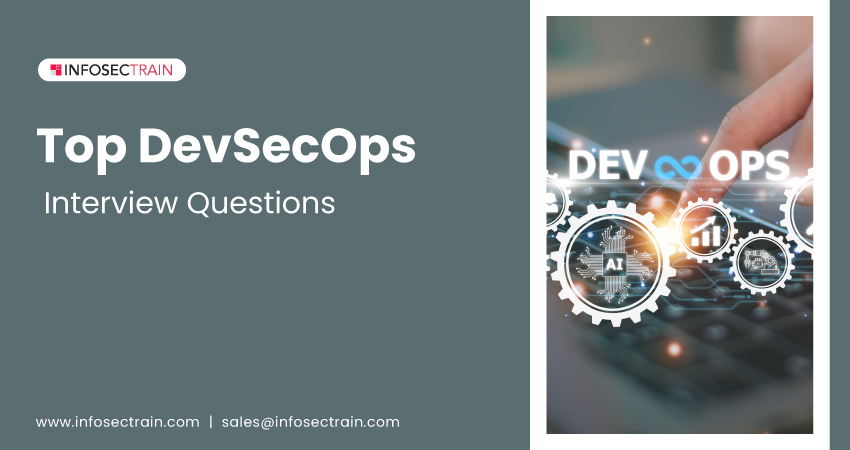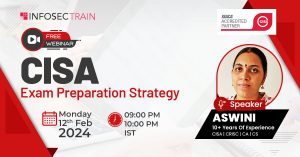Top DevSecOps Interview Questions
With the rapid advancement of technology, it has become paramount to integrate security throughout the software development lifecycle. DevSecOps, which combines development, security, and operations, has emerged as a holistic approach to ensure that security is not overlooked but an inherent part of the entire software delivery process. Within the domain of DevSecOps, interviews play a pivotal role in assessing a candidate’s understanding of this integrated methodology and their ability to navigate the complex landscape of security-focused software development.

This article provides a collection of top DevSecOps job interview questions and answers. Whether you are preparing for an interview or seeking to enhance your understanding of DevSecOps, these questions and answers provide a comprehensive foundation for success in the ever-evolving landscape of secure software delivery.
Top DevSecOps Interview Questions and Answers:
1. Describe DevSecOps security.
DevSecOps security integrates proactive and continuous security measures throughout the software development lifecycle. This approach ensures early identification and mitigation of vulnerabilities, aligning development, security, and operations.
2. What are the DevSecOps core principles?
The core principles of DevSecOps include the following:
- Automation: Automated security checks and deployments ensure consistency.
- Collaboration: Foster communication between development, security, and operations teams.
- Continuous Security: Embed security checks throughout the software development pipeline.
- Shift-Left: Integrates security early in development to detect and address issues sooner.
- Risk Management: Identify, assess, and mitigate security risks in real-time.
3. What are the differences between continuous deployment and continuous delivery?
| Continuous Deployment | Continuous Delivery |
| Deployment is fully automated without manual intervention | Delivery requires manual approval |
| Slightly higher risk | Lower risk due to manual release |
| Rapid, consistent deployments as soon as the code is ready | Frequent releases, but deployment timing can vary |
4. Describe the different phases of the continuous software delivery model.
The continuous software delivery model consists of several phases:
- Development: Developers write code and collaborate on new features and improvements.
- Build: Code is compiled, built, and packaged into deployable artifacts.
- Test: Various automated tests, including unit, integration, and regression tests, verifies functionality and detects issues.
- Staging: Deployed code is tested in an environment simulating production.
- Deployment: Code is released to production if tests pass.
- Monitoring: Continuous monitoring ensures performance and detects anomalies.
- Feedback: User feedback and monitoring data guide further improvements.
5. Describe the “blue-green deployment” pattern.
The “blue-green deployment” pattern is a deployment strategy that involves maintaining two identical environments, “blue” for the current version and “green” for the new one. This method enables seamless, risk-free updates by switching between the two environments. It also minimizes downtime and allows quick rollback if any issues arise, guaranteeing a smooth user experience during updates.
6. What are the benefits of SAST in the DevSecOps Process?
Benefits of SAST (Static Application Security Testing) in DevSecOps are:
- Identifies security flaws in the code during development
- Integrates security in the early stages of SDLC
- Enhances overall code quality
- Fixes issues early, reducing costly post-production remediation
- Integration in CI/CD pipeline for continuous security
7. What benefits does version control provide?
Benefits of version control are:
- Allows multiple developers to collaborate on the same codebase
- Monitor modifications, facilitates troubleshooting and accountability
- Review code history and contributions
- Restore previous working versions
- Ensures code consistency and minimizes errors
8. Describe Continuous Integration.
Continuous Integration (CI) is a widely used DevOps practice where developers regularly integrate their code changes into a shared repository. The primary objective is identifying integration issues early and ensuring a consistent, reliable software build.
9. Describe Continuous Deployment.
Continuous Deployment (CD) extends the principles of continuous delivery. It involves automatically deploying code changes to the production environment after passing automated tests without human intervention.
10. In DevSecOps, why is logging important?
Logging in DevSecOps is crucial for:
- Detecting security incidents and anomalies
- Monitoring application behavior and performance
- Supporting incident response and post-incident analysis
- Maintaining compliance across the development and operational phases
11. What is fuzz-based testing?
Fuzz-based testing, or fuzzing, is a software testing technique that deliberately manipulates inputs to a program or system with unexpected, invalid, or random data to detect vulnerabilities, crashes, and unexpected behaviors.
12. What are common security risks that DevSecOps seeks to reduce?
Common security risks that DevSecOps aims to mitigate include:
- Unauthorized access
- Code vulnerabilities (e.g., SQL injection)
- Insecure configurations
- Data breaches
- Insecure deployments
- Insufficient compliance measures
13. Which security aspect should be considered during the software development design phase?
Security considerations that should be addressed during the software development design phase include:
- Authentication and authorization
- Data encryption
- Secure APIs
- Secure communication
- Input validation
- Least privilege principle
- Secure architecture
- Threat modeling
- Error handling
- Data privacy
- Security testing
14. What is the “shift-left” approach in DevSecOps?
The “shift-left” approach integrates security practices and considerations earlier in the software development lifecycle. It helps prevent potential security issues from progressing to later stages, reducing risks and costs associated with addressing vulnerabilities later in the process while ensuring higher-quality software.
15. List out the uses of the “shift-left” approach in DevSecOps.
The shift-left approach benefits in DevSecOps are:
- Early integration of security practices
- Identify and address vulnerabilities in the development
- Faster issue resolution
- Reduced post-production risks
- Reduced remediation costs
- Enhanced collaboration among teams
- Accelerated delivery while maintaining security
16. What benefits does Infrastructure as Code (IaC) provide in a DevSecOps environment?
Benefits of Infrastructure as Code (IaC):
- Ensures reproducible and uniform infrastructure deployments
- Automates secure configurations and minimizes the risk of human errors
- Streamlines provisioning and maintenance operations
- Easily scales resources up or down as per the requirement
- Monitors changes and allows rollbacks if issues arise
17. List out some benefits of Continuous Integration (CI).
Benefits of Continuous Integration (CI) are:
- Integration issues are caught early, reducing the debugging effort
- Developers work on isolated branches and merge frequently, fostering teamwork
- Automated tests provide rapid feedback on code changes
- Frequent integration minimizes the complexity of integrating code
18. Explain the importance of Role-based Access Control (RBAC) in a DevSecOps environment.
RBAC plays a critical role in a DevSecOps due to its several benefits:
- It assigns specific permissions to roles.
- It restricts access based on job responsibilities.
- It reduces unauthorized access and attack surface.
- It enforces the principle of least privilege.
- It enhances security and compliance.
19. Describe the concept of immutable logs in DevSecOps.
Immutable logs are unchangeable log records that capture system activities. They enhance security by preventing tampering, providing reliable audit trails for investigating incidents and maintaining compliance.
20. What is containerization, and how does it impact DevSecOps environment security?
Containerization is a method where applications and their dependencies are packaged together in isolated environments known as containers. These containers ensure consistent and portable deployments across various domains. In DevSecOps, it improves security by:
- Isolating processes, limiting potential breaches
- Consistent environments enhance testing and reproducibility
- Ensure secure and reliable application delivery
- Vulnerabilities are contained, simplifying patching and updates
To find additional interview questions related to DevSecOps, please refer to our other blog: DevSecOps Interview Questions
How can InfosecTrain help?
Obtaining a position within DevSecOps is a dream come true for many individuals. The list of DevSecOps interview questions and their corresponding answers can greatly enhance your prospects of successfully navigating the interview process.
At InfosecTrain, we are ready and enthusiastic to guide you toward your professional objectives. If you are seeking professional guidance and strategic insights into DevSecOps, you can enroll in our AZ-400 Microsoft Certified: Azure DevOps Engineer Expert and Certified DevSecOps Engineer (E|CDE) certification training program. Your aspirations are our priority, and we are here to support you every step of your journey.

TRAINING CALENDAR of Upcoming Batches For Certified DevSecOps Engineer
| Start Date | End Date | Start - End Time | Batch Type | Training Mode | Batch Status | |
|---|---|---|---|---|---|---|
| 16-Mar-2024 | 07-Apr-2024 | 09:00 - 13:00 IST | Weekend | Online | [ Open ] |



 1800-843-7890 (IN)
1800-843-7890 (IN) sales@infosectrain.com
sales@infosectrain.com
 1800-843-7890 (India)
1800-843-7890 (India) 
